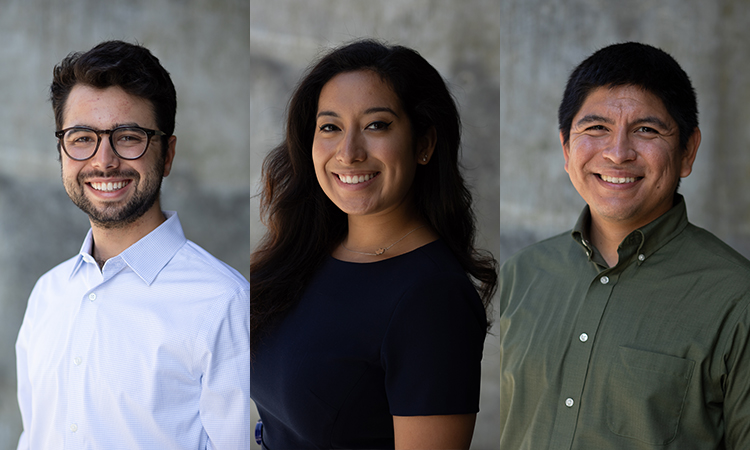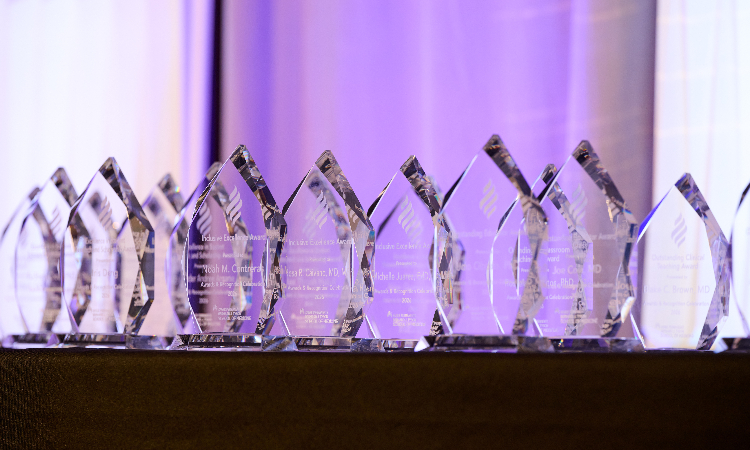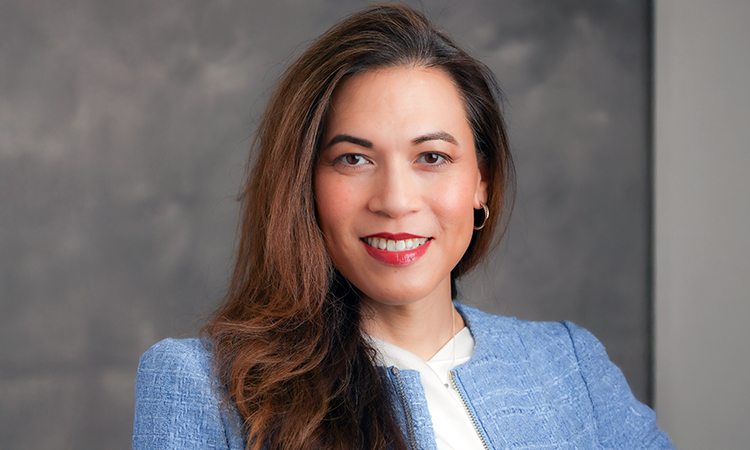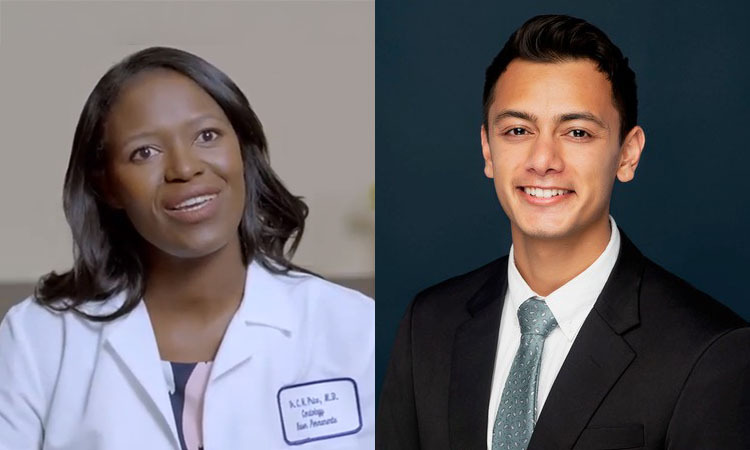In the final days of their medical school journey, students of Kaiser Permanente Bernard J. Tyson School of Medicine’s Class of 2025 find themselves caught in a whirlwind of apprehension, pride, nostalgia, and dreams as they prepare for a new life chapter. Each graduating student who crosses the stage to receive the Doctor of Medicine (MD) degree in the school’s second Commencement Ceremony on Monday, May 12, at the Pasadena Convention Center will be ready to embrace the challenges that await in residency and beyond—even as they bid a bittersweet farewell to the faculty members and colleagues who have shaped their experiences over the past four years.
In the following interview excerpts, three KPSOM students share their thoughts on the eve of this transformative moment. Their answers have been lightly edited for clarity and length.
What will walking across the stage and receiving your MD degree mean for you?
Jacob Abrahams: It's both the end and the beginning of a big part of my training. I think it's going to be really nice to be able to introduce myself as a physician. But I also am pretty aware that I have a lot of learning left to do. And I'm excited to start this new chapter, where I really get to find out, you know, what exactly I want to do with this degree and what I envision my career looking like going forward.
Daniela Wong Pacheco: Walking across that stage and receiving my medical degree will be one of the most meaningful moments of my life. It will represent not just the culmination of four intense years of medical school, but also the fulfillment of a dream that’s been growing since long before I ever put on a white coat. It will mean honoring all the sacrifices that I, and all the people who supported me, have made, and will also mean acknowledging the growth, challenges, and resilience that got me here. It will be a powerful symbol of the responsibility [that] I am choosing to embrace: to serve as a compassionate, knowledgeable, and change-making physician.
Jesus Fuentes: [It] means reaching a milestone that I’ve been working towards a long time, since I was 18 years old [and] validation for the belief, support, and sacrifices everyone has placed in me up to this point. [It] feels exciting (and appropriately nervous) to signal that I will be working as a physician soon in the next few months. Walking across will feel surreal given everything that has happened in my life. [It is a] reminder that this was never mine alone, and I bring everyone that has been part of the journey (students, friends, classmates, teachers, communities, family). [It] means that I further along the path to … play my small role in enacting micro and macro changes to eliminate disparities and provide excellent care to the resilient communities I wish to serve in my career. From within the clinic room to working on healthy policy, that is the responsibility I take seriously.
What challenges did you have to overcome during medical school?
Daniela Wong Pacheco: Medical school is inherently demanding, but for me, the journey also included moments of intense self-doubt, personal sacrifices, and learning how to navigate uncertainty with grace. There were times when the emotional weight of patient care, the pressure to constantly perform, and the struggle to balance school with life outside of medicine felt overwhelming. But those very challenges pushed me to develop resilience, lean on my community, and refine my sense of purpose. I learned how to advocate for myself and for others, how to stay grounded in the "why" behind this path, and how to find strength in vulnerability.
Jesus Fuentes: Having to evacuate the Eaton fire, pushing through the whipping wind with the ominous glow of fires far too near us as [my partner and I] loaded our car with our family and few belongings has left a unique imprint. Being displaced due to the Eaton fire was not part of how I envisioned my last five months of medical school… Navigating a natural disaster again (I was living in [Mexico City] when the 2018 earthquake occurred), this time with my family such as having to move often until we could relocate to Northern California with family, while completing my final requirements was not easy to say the least. Thanks to the support of my incredible partner, Tabitha, family, and friends we were able to move ahead. That absolutely makes graduating that much sweeter.
Jacob Abrahams: I was diagnosed with a brain tumor right before I started school. And it was a really difficult transition to complete treatment in May and then starting [medical school] in July. You know, being able to have that experience of really confronting something that was really life-changing at the time was difficult. But it also helps me connect with patients in a way where I [can] relate to a lot of experiences of knowing what it's like to receive life-changing news and how that can really upend everything.
Jesus Fuentes: Other events that occurred these past four years were navigating health issues at times [and] becoming a papa to my two hijos, which has been a duality of joy and exhaustion that I am grateful for every day. It is one of the greatest joys I have had the privilege to experience (in addition to some sleepless nights). Having my hijos and incredible partner with me during this path has been invaluable. They only add further fuel to my fire to keep going and be part of the change I wish to see.
Daniela Wong Pacheco: Navigating medical school in a rapidly shifting social and political climate added a layer of uncertainty. Subtle but constant reminders of how healthcare is influenced by forces far beyond the exam room sometimes left me wondering what kind of medical landscape I’d be entering. Still, those experiences have only deepened my commitment to staying grounded in empathy and equitable healthcare, even when the systems around us are evolving in unpredictable ways. Each obstacle became a catalyst for growth. So, when I walk across that stage, it won’t just be a celebration of academic achievement, rather it’ll be a moment that honors the grit, persistence, and heart it took to get here.
What are you looking forward to in residency?
Jesus Fuentes: [I am] grateful and thrilled to match at UC Davis for Neurology. Knowing my patients, gaining knowledge of the vast beauty that lies within neurology, and getting better at reading neuroimaging and my neurological physical exams; being back in Northern California to spend time with their incredible communities; biking to the hospital (very excited to be moving as opposed to sitting in traffic for my commute to work); [enjoying] the foodie scene in Sacramento, from all kinds of amazing restaurants to the farmer’s market and delicious bakeries.
Jacob Abrahams: I'm looking forward to working in a new setting, meeting new people, creating a new community, and honing those clinical decision-making skills that I've been trying to improve on for the last four years. I [was] lucky to match the Mount Sinai Hospital in New York City. I'm excited to live in New York again, you know, be a little bit closer to my loved ones and be in a city that's a little bit more walkable.
Daniela Wong Pacheco: I am mostly looking forward to refining my clinical knowledge and skills, while gaining confidence in myself as a blooming physician. I’m also looking forward to the relationships with patients, mentors, and my co-residents! There’s something really special about being present during vulnerable moments in people’s lives and earning their trust. I want to keep learning how to show up not just as a competent doctor, but as someone who listens deeply and advocates for everyone around me.
How have your mentors and supporters contributed to your success in medical school?
Jesus Fuentes: [I want to thank] Dr. Eduardo Godoy, KPSOM Family Medicine preceptor for two years, for demonstrating many of the qualities I wish to emulate as a physician and being an excellent clinical teacher. Dr. Resa Caivano, KPSOM physician and Service-Learning Lead, was a trusted mentor and advisor to stay true to my goals/vision. [I thank] Dr. Lisa Montes, for providing support and belief as my REACH coach [and] Dr. Ricardo Jimenez-Kimble, Dr. Chileshe Nkonde-Price, Dr. Gabriel Lopez, Dr. Dolgor Baatar, Dr. Ryan Lee, and Dr. Aravind Chandrashekar, for being excellent clinical teachers to help establish my foundation of knowledge in the classroom, especially as a non-traditional student returning to the swing of academics. [And I'd like to thank my] incredible partner, Tabitha – from constantly giving me belief to holding down everything with our family, she has been an incredible human being, whom I credit immensely for getting to this point.
Jacob Abrahams: Dr. Gould (Michael Gould, MD, MS, Faculty Director of Research) was a really great research mentor. He really helped me take ownership of a big project that I started [that’s about to] be published and it's my first author publication ever. And that wouldn't have been possible without some of the guidance here. Dr. Taur (Alison Taur, MD, Clinical Associate Professor of Clinical Science) is such a big inspiration as someone who's done a lot of work with LGBTQ health. Now more than ever, it's nice to kind of have a strong community really advocating for the healthcare and the rights of people who are … in harm's way. It’s nice to see someone who's a tireless advocate, and something I aspire to be.
Daniela Wong Pacheco: I am lucky to have an extremely large support circle: My husband, my family, Dr. Chileshe Price, Dr. Mingsum Lee, Dr. Timothy Leifer, Dr. Frances Hetherington, Dr. Ingrid Binswanger, Dr. James Onwuzurike, [KPSOM students] Michael Chapek, Masha Kotlyarevskiy, Victor Escobedo, Michael Langevin, Wilkin Muñoz, and Kaleigh Allen, all the LAMC girlies (gender neutral), my mentors from UCLA, Dr. Hillary Coller and Dr. Aaron Ambrus, my teachers from high school Melony Walsh, Joy McCall, and Raymond Hart, [and] my hometown friends... I’m sure I’m leaving so many people out, so I apologize! Thank you so much for your support, I could not have done this without you all.
Jesus Fuentes: [My] personal journey to medicine is unique in several aspects. I am underrepresented in various ways, from being a brown Mexican American man to being first generation, both in citizenship and first to graduate college in my family. As the proud son of Mexican immigrants, I witnessed firsthand many of the inequities and consequential trauma many communities in the U.S. face due to racism, xenophobia, and economic disparities rooted in discriminatory policies and laws. Utilizing resilience, family support, and perseverance, I navigated the college application process on my own, finding programs like QuestBridge to eventually enable me the opportunity to gain acceptance to the University of Pennsylvania. I am the first from my high school to leave California for college, and first to attend [and] graduate from an Ivy League school.



